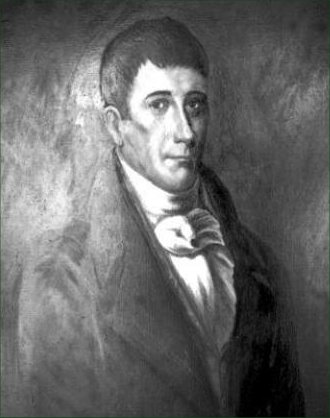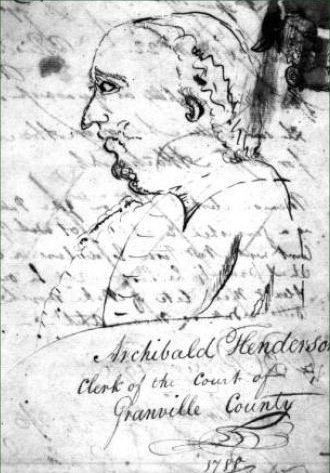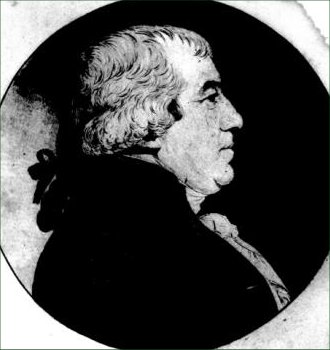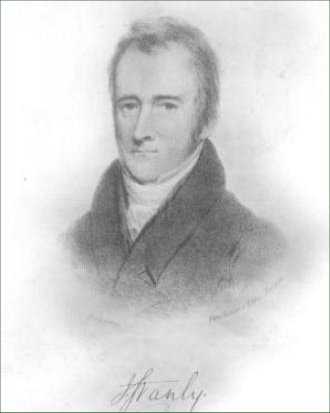Publisher's note: We believe the subject of history makes people (i.e., American people) smarter, so in our quest to educate others, we will provide excerpts from the North Carolina History Project, an online publication of the John Locke Foundation. This one hundred and twenty-third installment, By William K. Bolt, University of Tennessee, is provided courtesy of the North Carolina History Project, and re-posted here with permission from NC Historic Sites.
Governor Benjamin Williams, a member of the Federalist Party, was elected in 1800, 1801, and 1807. Image courtesy of the North Carolina Office of Archives and History, Raleigh, NC.
Originally, the term "Federalist" referred to supporters of the federal constitution of 1787. The Federalist political party emerged during George Washington's presidency. Its members tended to be former Revolutionary War officers, merchants, financiers, and the landed aristocracy, who believed the lower classes should defer to elites. Government must resist the temptations of subscribing to the passions of the day, Federalists argued, so they unsurprisingly shunned democracy. Because of these conservative beliefs, the Federalist Party became the party of the elites.
Federalist Party membership believed that the new nation should replicate the policies of Great Britain. To accomplish this, Federalists, led by Secretary of the Treasury Alexander Hamilton, adopted a loose construction of the new constitution to strengthen the new government, earn foreign respect, and solidify the new union of states.
Many Americans objected to these policies and compared Hamilton to Robert Walpole, a British Prime Minister who used corruption to achieve his legislative goals. They feared that Hamilton's plans would take America from its agrarian roots and make it into a commercial republic devoid of virtue and hard-won liberties. However, the presence and reputation of Washington shielded the Federalists from any electoral backlash. In the presidential election of 1792, Washington again received every electoral vote.
In 1795, Chief Justice John Jay negotiated and the Senate ratified what came to be known as the Jay Treaty. This treaty with Great Britain offered only a few concessions that involved pledges the young nation already made in the Treaty of Paris. As a result, Jay was burned in effigy throughout the country, and President George Washington, who supported the treaty at Hamilton's urging, fell into disfavor.
Archibald Henderson was a Federalist member of Congress from 1799-1803. This likeness of Henderson was found in the 1788 Granville County record. Image courtesy of the North Carolina Office of Archives and History, Raleigh, NC.
Because of the Jay Treaty and Washington's decision not to seek a third term, the Republican Party emerged as an opposition party. Although a varied lot, Republicans found common ground in their dislike of the centralizing tendencies of the federal government. In the election of 1796, this new party supported Thomas Jefferson in his presidential bid against Vice President and Federalist John Adams. Adams defeated Jefferson by only three electoral votes.
As president, Adams feuded with Hamilton and other Federalist leaders. He waged an undeclared naval war against France and spent most of his presidency expecting a more protracted conflict to erupt. Congress eventually complied with Adams's request to increase the size of the army but stipulated that Washington should lead the army and that Hamilton should be second in command. In 1798, with the threat of war against France growing daily, Adams signed the Alien and Sedition Acts. These acts allowed the federal government to imprison political dissenters and extended the period of naturalization for immigrants. Republicans condemned these acts and made them a campaign issue in the election of 1800.
James Iredell, Sr., one of North Carolina's leading members of the Federalist Party, lived in Edenton and was appointed a Justice on the first United States Supreme Court. Image courtesy of the North Carolina Office of Archives and History, Raleigh, NC.
The unpopularity of the Alien and Sedition Acts and the bickering among Federalists allowed Jefferson to win the presidency in 1800. Once in office, Jefferson removed many Federalists from their offices. As the minority party, the Federalists objected to Jefferson's policies, especially the acquisition of the Louisiana territory; they argued ironically, that the federal government did not have this power. The Federalists lone stronghold of power became the judiciary. Appointed to be Chief Justice immediately before Jefferson became president, John Marshall's decisions augmented the powers of the federal government and paved the way for the economic development of the nation.
Discontent over the embargo of 1807 allowed the Federalist Party to gain seats in Congress, but five years later, Congress declared war against Great Britain even though every Federalist voted against it. In 1814, upset at the progress of the war, Federalist leaders convened in Hartford and issued a series of demands: a one term presidency, a two-thirds majority to declare war or admit new states to the union, and the prohibition of embargoes of more than sixty days. Some members of this convention argued that New England states should secede from the union. The demands of the Hartford Convention reached Washington, D.C. at the same time as news of the American victory at New Orleans. Consequently, bad timing contributed greatly to discrediting the party.
John Stanly, a merchant-shipper from New Bern, North Carolina, accumulated a substantial fortune in land and slaves. Image courtesy of the North Carolina Office of Archives and History, Raleigh, NC.
The Federalist Party became inconsequential in national politics after this. In 1816, Federalist Rufus King polled only thirty-four electoral votes in his presidential bid. Four years later, James Monroe won every electoral vote except one. During the Missouri Crisis, Federalists tried to prohibit Missouri from entering the Union. Republicans viewed the Federalists as trying to foment sectional discontent and quickly closed ranks.
Outside of New England, the Federalist Party enjoyed some of its biggest successes in North Carolina. Federalist electors gave one of the state's electoral votes to John Adams in 1796 and four more in 1800. Jefferson won all of the state's electors in 1804, but his successor, James Madison, lost three of these to Charles Pinckney in 1808. No Federalist presidential candidate won an electoral vote from North Carolina after that. Following the "Revolution of 1800" that brought Jefferson into the Executive Mansion, Federalists still sent members of their party to Congress. Although they never achieved a majority in the North Carolina legislature, Federalist membership almost reached forty percent. Federalist Benjamin Williams won the governorship in 1800, 1801, and 1807. North Carolina Federalists tended to come from the Cape Fear region, the coastal region near New Bern, and the Piedmont. The most prominent Federalists in North Carolina were William Davidson, William Gaston, Archibald Henderson, James Iredell, William Polk, and John Stanly.
Though the Federalist Party existed for less than half of a century, it helped define the new nation. Though they may have lost many political battles, Federalists may have won the war, for their vision of a cosmopolitan and industrialized America eventually came to fruition.
Sources:
James M. Banner, To the Hartford Convention: The Federalists and the Origins of Party Politics in Massachusetts, 1789-1815 (New York, 1970); Lance Banning, The Jeffersonian Persuasion: Evolution of a Party Ideology (Ithaca, 1978); James H. Broussard, The Southern Federalists, 1800-1816 (Baton Rouge, 1978); Stanley Elkins and Eric McKitrick, The Age of Federalism: The Early American Republic, 1788-1800 (New York, 1993; Todd Estes, "Shaping the Politics of Public Opinion: Federalists and the Jay Treaty Debate," Journal of the Early Republic XX (Fall, 2000); David H. Fischer, The Revolution of American Conservatism: The Federalist Party in the Era of Jeffersonian Democracy (New York, 1965); Delbert H. Gilpatrick, Jeffersonian Democracy in North Carolina, 1789-1816 (New York, 1967); Adrienne Koch and Harry Ammon, The Virginia and Kentucky Resolutions: An Episode in Jefferson's and Madison's Defense of Civil Liberties," William and Mary Quarterly V (April, 1948); John C. Miller, The Federalist Era, 1789-1801 (New York, 1960); Glover Moore, The Missouri Controversy, 1819-1821 (Lexington, 1953); Carl E. Prince, "The Passing of the Aristocracy: Jefferson's Removal of the Federalists, 1801-1805," The Journal of American History, LVII (Dec. 1970).





If we had paid attention to the good things of nature preservation and worship of the Native Americans, we might actually have a land not raped for natural resources!
Much more of a person's outlook on politics has to do with personal gain over some real ideals. Someone wisely said, "A Republican is just a Democrat who made lots of money---and wants to keep it all!"